江苏省东台市南沈灶镇中学九年级英语上册《Unit 4 TV programmes》Grammar 2教学案(无答案) 牛津版
- 格式:doc
- 大小:107.51 KB
- 文档页数:3

知识目标:(A) 1. To use ‘between…and…’ to express a period of time.2. To use ‘from…to…’to express a period of time.3. To use ‘before, after’ and ‘until’ to talk about when things happen.4. To use ‘while’ and ‘as’ to talk about when things happen. 能力目标:(B)To train the students’ abilities of using English correctly.重点:1. To use ‘before, after’ and ‘until’ to talk about when things happen2. Learn how to use conjunctions of time ‘while’ and ‘as’.难点:Learn how to use the structures in a flexible way.教学方法:Multi-media教学过程:Step One Free talkEncourage students to speak more English.eg. T: What’s your favourite programme?S: My favourite programme is Sports City.T: Me too. And I like sports very much. I have sports from five to seven every morning. And you?S: …T: Mary, I want to know who sits between Tom and you?S: …Step Two Presentation1. Tell students that when we watch TV, we always see a programme forecast onTV. Write a list of times on the board with programme names.Make some sente nces by using ‘between…and…’,‘from…to…’ and ‘before, after, until’7 p.m. News7.30. p.m. Weather Report Ss try to check their answers.7.35. p.m. Around the world8. p.m. Documentary: Wildlife in China2.Do the exercise on page69&70.3.DiscussionAsk students to discuss with their partner about the rule of “from…to…,between…and…,before,after,until”. If necessary, teacher can explain it.e ppt to show some sentences with while and as. And ask students what differences are.5. Explain the context of the exercise at the top of page71. Millie is asking Daniel about what he did last night. Ask students to read through the conversation for all over meaning and complete with ‘while’ and ‘as’.6.Ask students to try to e xplain ‘while’, ‘as’ .Step Three Make a dialogStep Four Exercises当堂检测 (必做题)一、 Translate the following phrases.1.全世界2.新闻摘要3.天气预报4.洗淋浴5.中国少年6.从早到晚7.想起做某事 8.直到….才…9.进入房间 10.走过书店二、 Fill in the blanks with the given words.1. The phone rang while he____________ (do) his homework .2. After that, I need_____________ (go) to bed.3. Who stopped him from ___________ (go) there?4. He won’t go out to play until he _____________ (finish) his work.5. She has written her novel ____________ (success).5. You’ll find this film a bit __________ (bore ).7. As they were walking along the river, they ___________ (sing).8. I _________ (read) a book from 6 to 7 yesterday evening.9. If you don’t take a shower, I __________ (not do) it ,either.10. Don’t get off the bus until it _______ (stop).三、选择题()1.I w on’t tell them anything __________you allow me to do it .A. asB. untilC. whileD. after()2.The child always has some snacks ____________ lunch and supper .A. whenB. betweenC. untilD. from()3.You can watch TV ____________ 8 to 10 tonight .A. fromB. asC. betweenD. while()lie became famous ____________ she got the prize.A. whileB. untilC. afterD. before()5.If you work _____________, you will be able to do better .A.hardly B. more hardly C. harder D. more hard四、用before, after, until, while或as完成下列短文(1)________I was on the school bus this morning, it started to rain. Luckily, It stopped (2)______ we got to school so I didn’t get wet.(3)______ After school, I played tennis with Amy . Then (4)_____ that , I saw Daniel at the bus stop.(5)_______we were waiting for the bus, it started to rain again. We waited inside(6)_______the bus came.Later in the afternoon, I talked to Sandy on the phone (7)_______ I got home from school. We chatted (8)________5.30p.m . (9)_______we finished talked, I did my homework. (10)_________ I was doing my homework, Mum came home. She said I should finish my homework (11)______dinner because she knew that I wanted to watch TV(12)_______dinner.(13)_______watching China’s Teens, I watched a film. However, I fell asleep(14)______ I was watching it. I went to bed(15)________it finished and didn’t see the end.当堂检测 (选做题)五、将下列句子译成英语1.晚上7.30到7.40 我可以看天气预报。

总课题9A Unit 4 TV programmes 总课时10 第2课时课题Reading (I) 课型新授教学目标知识目标To recognize and understand vocabulary related to programmes. 能力目标To identify statements as true or false based on the reading passage.情感目标To match students’ preferences and sc hedules to TV programmes.教学重点The same as the aims.教学难点Infer general meaning from title and context.教(学)活动自主个案预习导学翻译下列短语。
1. 报道不同的体育(信息)2. 发现……有点枯燥/烦扰3. 即将到来的星期六4. 宣布结果5. 获得两张免费的音乐会门票6. 充满7. 一小时的记录片8. 比熊猫消失得还要快9. 自然的栖息地10. 获得优秀摄影奖教学过程Step 1 GreetingsStep 2 Free talkHave a free talk with the students. Revise something l earnedHow many hours of TV do you watch every day?What is your favorite TV Programmes?What is your favorite host?Step3 Presentation1. Ask students whe ther they plan their TV viewing or if they just switchthe TV on when they find information about which programmes are on and whatthe programmes are about.2. Play the tape and students read after it. Ask students if they have everwatched such programmes.3. Ask Ss some questions to check their understandingStep4 Practice1.Ask students to put forward their own questions and discuss in class.2 .Encourage students to think them over3.Ask Ss to find out the language points they don’t know and try to explainthem.4.Ask some of them to read the paragraphs and summarize the main ideas.5.Do some written work in class.Step 5 Homework1.Try to recite the text.2. Review the paragraphs and new vocabulary.课内研讨1. 仔细阅读课文,回答下列问题。
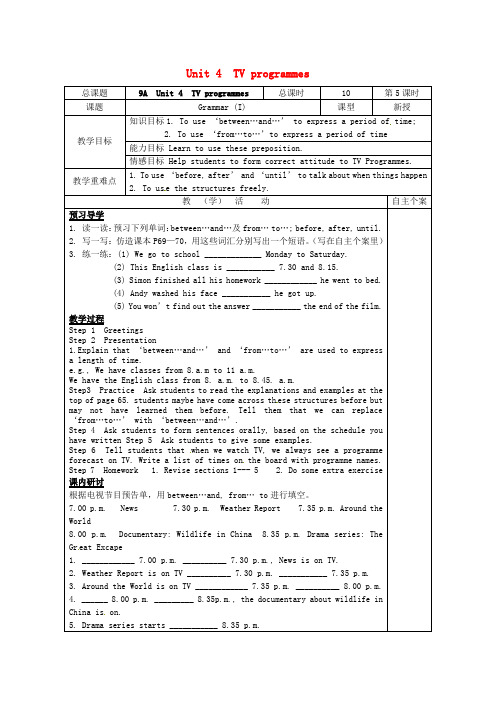
Unit 4 TV programmes总课题9A Unit 4 TV programmes 总课时10 第5课时课题Grammar (I) 课型新授教学目标知识目标1. To use ‘between…and…’ to express a period of time;2. To use ‘from…to…’to express a period of time能力目标 Learn to use these preposition.情感目标 Help students to form correct attitude to TV Programmes.教学重难点1. To use ‘before, after’ and ‘until’ to talk about when things happen2. To us e the structures freely.教(学)活动自主个案预习导学1. 读一读:预习下列单词:between…and…及from…to…; before, after, until.2. 写一写:仿造课本P69—70,用这些词汇分别写出一个短语。
(写在自主个案里)3. 练一练:(1) We go to school _____________ Monday to Saturday.(2) This English class is ___________ 7.30 and 8.15.(3) Simon finished all his homework ____________ he went to bed.(4) Andy washed his face ___________ he got up.(5) You won’t find out the answer ___________ the end of the film. 教学过程Step 1 GreetingsStep 2 Presentation1.Explain that ‘between…and…’ and ‘from…to…’ are used to expressa length of time.e.g., We have classes from 8.a.m to 11 a.m.We have the English class from 8. a.m. to 8.45. a.m.Step3 Practice Ask students to read the explanations and examples at the top of page 65. students maybe have come across th ese structures before but may not have learned them before. Tell them that we can replace ‘from…to…’ with ‘between…and…’.Step 4 Ask students to form sentences orally, based on the schedule you have written Step 5 Ask students to give some examples.Step 6 Tell students that when we watch TV, we always see a programme forecast on TV. Write a list of times on the board with programme names. Step 7 Homework 1. Revise sections 1--- 5 2. Do some extra exercise 课内研讨根据电视节目预告单,用between…and, from… to进行填空。
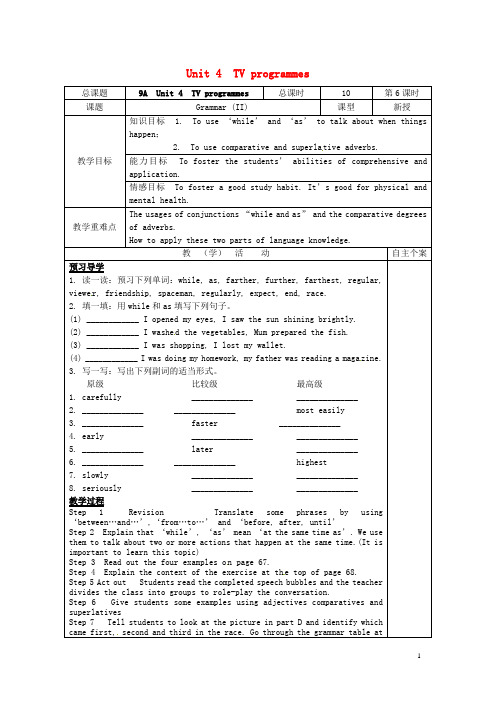
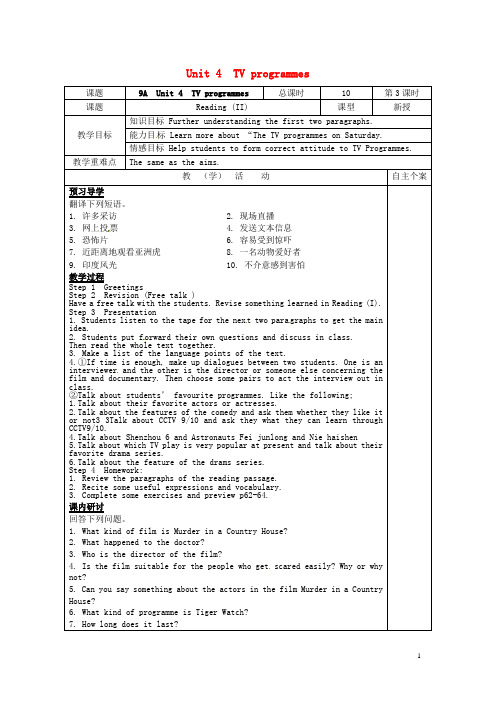
Unit 4 TV programmes课题9A Unit 4 TV programmes 总课时10 第3课时课题Reading (II) 课型新授教学目标知识目标 Further understanding the first two paragraphs.能力目标Learn more about “The TV programmes on Saturday.情感目标 Help students to form correct attitude to TV Programmes.教学重难点The same as the aims.教(学)活动自主个案预习导学翻译下列短语。
1. 许多采访2. 现场直播3. 网上投票4. 发送文本信息5. 恐怖片6. 容易受到惊吓7. 近距离地观看亚洲虎8. 一名动物爱好者9. 印度风光10. 不介意感到害怕教学过程Step 1 GreetingsStep 2 Revision (Free talk )Have a free talk with the students. Revise something learned in Reading (I).Step 3 Presentation1. Students listen to the tape for the nex t two para graphs to get the mainidea.2. Students put f orward their own questions and discuss in class.Then read the whole text together.3. Make a list of the language points of the text.4.①If time is enough, make up dialogues between two students. One is an interviewer and the other is the director or someone else concerning thefilm and documentary. Then choose some pairs to act the interview out inclass.②Talk about students’ favourite programmes. Like the following;1.Talk about their favorite actors or actresses.2.Talk about the features of the comedy and ask them whether they like itor not3 3Talk about CCTV 9/10 and ask they what they can learn throughCCTV9/10.4.Talk about Shenzhou 6 and Astronauts Fei junlong and Nie haishen5.Talk about which TV play is very popular at present and talk about theirfavorite drama series.6.Talk about the feature of the drams series.Step 4 Homework:1. Review the paragraphs of the reading passage.2. Recite some useful expressions and vocabulary.3. Complete some exercises and preview p62-64.课内研讨回答下列问题。

(A)知识目标:1. To understand vocabulary relating to TV programmes.2. To understand the new words and phrases.(A)能力目标:To think about TV preferences and rate different types of TV programmes.(B)情感目标:To use the things about TV Programmes in daily life.重/难点:1. To grasp Aims 1.2 fluently.2. To think about TV preferences and rate different types of TV programmes.教学方法:Multi-media教学过程:Step One. Free talk1.Have a free talk about the teenager problems, lead them to talk about theprogrammes they like to watch.2.Talking about the teenage problems and how to relax ourselves.Step Two Leading – inGo over teenage problems and then lead to TV programmes.Step Three Presentation1 Cut out some pictures of TV celebrities from newspapers or magazines. If possible, choose celebrities from English-language TV programmes. However, they should be well-known faces that students will recognize.2 Hold the pictures up one at a time, ask students to name the celebrities or the characters and name the title of the TV programmes that the stars in. As the students get the title correct, write it on the board.3 Once students have named all the programme titles, do a popularity survey, ask students what their favourite programme is.4. Use pictures to teach the new words: far, broadcast, studio and distance. Step Four Practice1.Explain the context of Part A on Page63. students are learning some TV vocabularyfrom an online quiz. Work together and match the words with the meaning by writingthe correct letters.2.Do Part BRead them and understand them. Get the students master the new words.Step Five PresentationListen to the tape with the questions: Will Eddie go shopping, Why?Make sure they understand the dialogue after listening. Explain the following if necessary.(fa r , farther, farthest, further, furthest from…to…/between…and…/ too…to…/ have nothing to do)Step Six Listen to the tape again and let the students read after it. Then act in pairs.Step Seven Exercise当堂检测 (必做题)一、单项选择1. The box is ____ heavy ____ I c an’t carry it .A. too, toB. so, thatC. very, thatD. too, that2. --------Let's go ____. The radio says tomorrow is a fine day .----------Good idea.A. hikeB. hikesC. to hikeD. hiking3. She is busy _____the room .The guests are coming now.A. cleaningB. cleanC. cleansD. to clean4. -------Where is the bookshop?-------It's ____ the post office ___ the store.A. across, fromB. far, fromC. between, andD. from, to5. I'm very thirsty. But there is ____ water in the bottle.A. fewB. a fewC. littleD. a little6. They all enjoy _____ computer games.A. playB. playsC. playingD. to play7. We have done a survey ____ our readers. Many of them support her.A. ofB. atC. forD. in8. --------Which is the way to the game centre?---------_____ and walk on until the end of the road.A. Turn to leftB. Turn leftC. To turn leftD. To turn to left9. At last a doctor was ______ .A. sendB. send forC. sentD. sent for10. Nothing can make him ____.A. give upB. to give upC. giving upD. to giving up二、根据课文对话内容,用相应的词填空Hobo wanted to go shopping today .But Eddie said he was __1.__ too busy _2.__ go with Hobo. He had to watch TV __3.__ 9:00 __4._ 12:00. Then he would like to have lunch and a sleep __5.__2:00 __6.__ 7:00. After that , it would be dinner time . Eddie thought a dog’s wor k is never __7.__.1._______2._________3._________4._________5._________6.________7._________ 当堂检测 (选做题)三、句型转换1. It rained so heavily that I couldn’t go out. 〈改为简单句〉The rain was ___ heavy ___ me ___ go out.2. They had lunch at school yesterday. 〈改为否定句〉They ___ ___lunch at school yesterday.3. Tom visits the Science Museum every year. 〈就划线部分提问〉________ ______ Tom ________ every year?4. The building near the Tea House is the People’s Hospital. 〈就划线部分提问〉_______ _________ is the People’s Hospital?5. What about going out for a walk after supper? 〈改为同义句〉________ _______ out for a walk after supper, shall we?四、完形填空One night, a thief broke into an old man’s house. He _1 _ a noise and woke up theold man and his wife. The husband told his __2_ to be silent, while he said loudly, ‘My dear, these days thieves are __3_. If they take _4__their clothes and put themon the table, people in the room will fall asleep and __5._wake up.' When the thief _6.__this, he took off his clothes _7__and was ready to work.At this _8__, the husband suddenly shouted in a loud voice. ‘Stop thief!Stop thief!’The thief was very frightened. He ran away as __9_as he could and __10__his clothes on the table.()1. A. make B. makes C. made D. making()2. A. son B. friend C. daughter D. wife()3. A. more B. faster C. cleverer D. stronger()4. A. off B. an C. in D. from()5. A. can’t B. couldn’t C. may not D. mustn’t()6. A. listened B. hear C. heard D. listen to()7. A. then B. at once C. now D. once()8. A. moment B. hour C. minute D. quarter()9. A. most quickly B. faster C. fast D. more quickly()10. A. forgot B. left C. got D. brought 六.根据文意及首字母提示补全短文Paul worked in an office. He didn’t have a wife, he didn’t have any children, e_1_. And he lived in an old house a_2_. He liked nothing but drinking. He almost spent all his money on drinks. Sometimes when he was h_3_, he had to borrow some money from his workmates to buy a little food.One evening, he m__4__ a friend of his in the street. The man asked him to have d__5__ in a restaurant. He was so happy that he drank a l_6__. When they left there at midnight , he could h__7__ stand. His friend had to s_8__ a taxi and asked the driver to take him home. Soon they arrived at the door of his house. The d__9__ helped him to get out of the taxi.‘Thank you, sir,’said Paul. ‘Now I can open the door myself.’The taxi went away, but he couldn’t put the key i__10__ the keyhole. At that time, a policeman came.‘What can I do for you,, sir?’ asked the policeman.‘Thank you, sir,’ said Paul. ‘The house is circling now. If you can make it not move,I can open the door myself.’1.________2.________3.__________4.__________5.__________6.________7.________8.__________9..__________10__________。
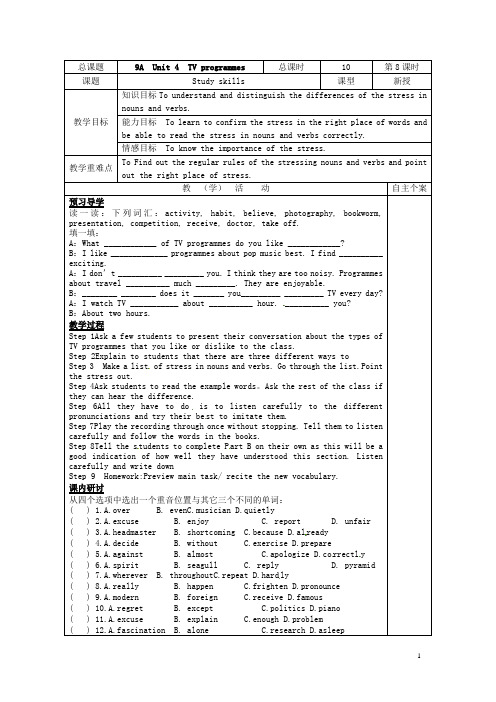
总课题9A Unit 4 TV programmes 总课时10 第8课时课题Study skills 课型新授教学目标知识目标To understand and distinguish the differences of the stress in nouns and verbs.能力目标 To learn to confirm the stress in the right place of words and be able to read the stress in nouns and verbs correctly.情感目标 To know the importance of the stress.教学重难点To Find out the regular rules of the stressing nouns and verbs and point out the right place of stress.教(学)活动自主个案预习导学读一读:下列词汇:activity, habit, believe, photography, bookworm, presentation, competition, receive, doctor, take off.填一填:A:What ____________ of TV programmes do you like ____________?B:I like _____________ programmes about pop music best. I find __________ exciting.A:I don’t __________ _________ you. I think they are too noisy. Programmes about travel __________ much _________. They are enjoyable.B:________ ________ does it _______ you_________ _________ TV every day? A:I watch TV ___________ about __________ hour. __________ you?B:About two hours.教学过程Step 1Ask a few students to present their conversation about the types of TV programmes that you like or dislike to the class.Step 2Explain to students that there are three different ways toStep 3 Make a list of stress in nouns and verbs. Go through the list.Point the stress out.Step 4Ask students to read the example words。
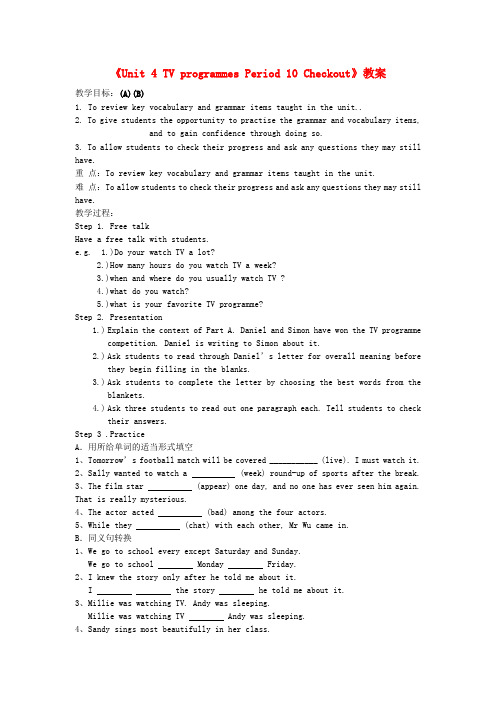
《Unit 4 TV programmes Period 10 Checkout》教案教学目标:(A)(B)1. To review key vocabulary and grammar items taught in the unit..2. To give students the opportunity to practise the grammar and vocabulary items,and to gain confidence through doing so.3. To allow students to check their progress and ask any questions they may still have.重点:To review key vocabulary and grammar items taught in the unit.难点:To allow students to check their progress and ask any questions they may still have.教学过程:Step 1. Free talkHave a free talk with students.e.g. 1.)Do your watch TV a lot?2.)How many hours do you watch TV a week?3.)when and where do you usually watch TV ?4.)what do you watch?5.)what is your favorite TV programme?Step 2. Presentation1.)Explain the context of Part A. Daniel and Simon have won the TV programmecompetition. Daniel is writing to Simon about it.2.)Ask students to read through Daniel’s letter for overall meaning beforethey begin filling in the blanks.3.)Ask students to complete the letter by choosing the best words from theblankets.4.)Ask three students to read out one paragraph each. Tell students to checktheir answers.Step 3 .PracticeA.用所给单词的适当形式填空1、Tomorrow’s football match will be covered ___________ (live). I must watch it.2、Sally wanted to watch a (week) round-up of sports after the break.3、The film star (appear) one day, and no one has ever seen him again. That is really mysterious.4、The actor acted (bad) among the four actors.5、While they (chat) with each other, Mr Wu came in.B.同义句转换1、We go to school every except Saturday and Sunday.We go to school Monday Friday.2、I knew the story only after he told me about it.I the story he told me about it.3、Millie was watching TV. Andy was sleeping.Millie was watching TV Andy was sleeping.4、Sandy sings most beautifully in her class.Sandy sings beautifully the other students in her class. 5、He won the first in the high jump.He was the of the high jump.Step 4. Play a game1. Tell students that there are five words from the unit hidden in the puzzlein Part B. Ask them to circle the words as they find them.2. Ask the students who finished the wordsearch first to read out the five words . Step 5 Exercises&homework当堂检测 (必做题)一、单项选择()1、For the next ten years, Mathild had not sent a _________ to her friend Jeanne.A. informationB. newsC. messageD. advice()2、Those who ________ the lecture were the students of Grade Two.A. attendedB. joinedC. took part inD. joined in()3、Don’t lose heart, my friend. Life is ___________ ups and downs.A. filled ofB. full withC. full ofD. fill of()4、There are many trees on____ side of the street, and____ of the trees is still increasing.A. both; the numberB. either; the numberC. both; a numberD. either;a number()5、There are many books in our school library, _____English, Chinese, math, and history.A. such asB. for exampleC. asD. liking()6、Some people don’t know the value of their health ______ they lose it.A. afterB. whenC. untilD. as()7、60,000 dollars is a lot of money, but it’s ________ than we need.A. far moreB. far lessC. very muchD. very little()8、You’d better stay at home ______ they _______.A. during; leaveB. while; leaveC. during; are awayD. while; are away()9、Don’t watch the horror film named The Haunted House, ?A. will youB. shall weC. do youD. aren’t you()10、 The documentary _____ that these tigers are being killed ____ their skin and bones.A. announces; asB. discovers; toC. covers; withD. explains; for二、词汇1、That piece of news will be ___________(播出) this evening.2、Those films are full of ____________(恐怖)and __________(神秘).3、We can learn a lot about the__________(最新的) news in this kind of newspaper.4、My father likes reading. He often buys __________(week) newspapers to read.5、People have _______(投票) for Beijing Music _________(颁奖会) on the Internet.6、There’s going to be a big _________(音乐会) next week.7、I found the _________(act) in _________(喜剧) very ________(fun).8、Our sports meeting will be held in the _________(come) week.9、I’m too so tired that I can’t walk any ___________(far).10、I think the activity __________(organize) by Mr Read is a great_________(成功).三、完成句子1、我喜欢观看动物方面的节目。

总课题9A Unit 4 TV programmes 总课时10 第9课时课题Main task 课型新授教学目标知识目标 1. To think about TV preferences; 2. To plan a TV programme;3.To write an outline of a story;4. To write a TV programme能力目标 To foster the students’ writing skills.情感目标 To foster the students’ good and harmonious relationship.教学重难点To write a list of a st ory and a TV programmes according to the list.教(学)活动自主个案预习导学读一读:下列词汇background, argue about, get angry with each other, disagree, relationship译一译:(1)住在一个公寓里(2)在上班(3)一直意见不和(4)为看什么电视节目而争执(5)生对方的气(6)将某物扔到桌上(7)跌到Nancy的脚边(8)一个孪生儿子/女儿(9)在百货公司(10)在购物中心教学过程Step 1Explain the context of the main task. There is a competition to writea story for a TV programme. Daniel and Simon have entered it. They wrotean outline and the story.Step 2Choose the students to read the background and plot in Part A.Step 3Ask some questions to check understandingStep 4Ask students to complete Part A2 using information from the outlinein Part A1. And then check in class.Step 5Ask a few students what they think will happen next in the story.Ask them what they would do if they were the characters. Discuss in pairs.Step 6 Divide the class into groups. Tell students they are entering the competition.Step 7Ask students to write a story for their programme using the elementsin their outline.Step 8 Homework: W rite another article about your favourite TV programmePreview Checkout课内研讨1. 答一答:(根据Par t A1和A2,回答下列问题)(1) Who is the story about?(2)How man y people are there in the Chen family?(3)Who are they?(4)Do the children get along well?(5)What did Nancy and Victor argue about?(6)What happened to the remote control?2. 根据首字母提示,下列句子应该填上哪些恰当的词呢?1. Do you know the b of this history event?2. Sandy is interested in the p of the drama series.3. They d with eac h other, they each have their own opinions.4. The students always a about their favourite pop stars.5. He kept talking in class, the teacher got a w him and the other students were also angry a his action/6. They boy f from the tree o the ground, but he wasn’t badly hurt.7. Simon, don’t t food to the animals, the zoo keeper will feed them.8. The actor is the main c in the film.9. --- What’s the r between the two boys? --- They are twin brothers.10. Andy is go od at sports, he is s .训练巩固书面表达。
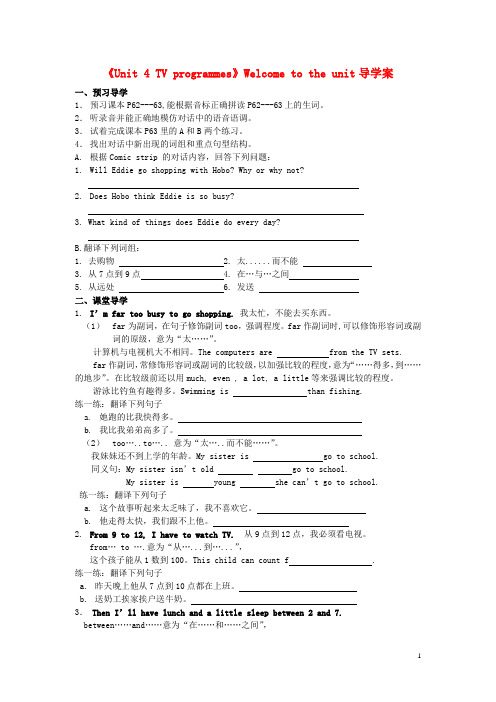
《Unit 4 TV programmes》Welcome to the unit导学案一、预习导学1.预习课本P62---63,能根据音标正确拼读P62---63上的生词。
2.听录音并能正确地模仿对话中的语音语调。
3.试着完成课本P63里的A和B两个练习。
4.找出对话中新出现的词组和重点句型结构。
A.根据Comic strip 的对话内容,回答下列问题:1.Will Eddie go shopping with Hobo? Why or why not?2.Does Hobo think Eddie is so busy?3. What kind of things does Eddie do every day?B.翻译下列词组:1. 去购物2. 太......而不能3. 从7点到9点4. 在…与…之间5. 从远处6. 发送二、课堂导学1.I’m far too busy to go shopping.我太忙,不能去买东西。
(1)far为副词,在句子修饰副词too,强调程度。
far作副词时,可以修饰形容词或副词的原级,意为“太……”。
计算机与电视机大不相同。
The computers are from the TV sets.far作副词,常修饰形容词或副词的比较级,以加强比较的程度,意为“……得多,到……的地步”。
在比较级前还以用much, even , a lot, a little等来强调比较的程度。
游泳比钓鱼有趣得多。
Swimming is than fishing.练一练:翻译下列句子a.她跑的比我快得多。
b.我比我弟弟高多了。
(2)too…..to….. 意为“太…..而不能……”。
我妹妹还不到上学的年龄。
My sister is go to school.同义句:My sister isn’t old go to school.My sister is young she can’t go to school.练一练:翻译下列句子a.这个故事听起来太乏味了,我不喜欢它。

Unit 4 TV programmes总课题9A Unit 4 TV p rogrammes 总课时10 第4课时课题Vocabulary 课型新授教学目标知识目标To understand key vocabulary related to TV program mes能力目标To use vocabulary to talk about different types of TV programmes 情感目标 Help students to form correct attitude to TV Programmes教学重难点The same as the aims.教(学)活动自主个案预习导学1. 读一读,预习下列单词并学会拼读:show, series, type, comedy, prize2. 填一填:预习课本P64 Part A,在图画下面填入正确的节目名称。
3. 选一选,预习课本P64 Part B,找出Sandy与朋友们分别喜欢哪种类型的电视节目。
I II( ) 1. Sandy A. chat show( ) 2. Millie B. cartoons( ) 3. Daniel C. game shows( ) 4. Simon D. documentaries( ) 5. Amy E. drama series( ) 6. Andy F. comedies教学过程Step 1 Revision (Free talk )1. Talk about which TV play is very popular at present and talk about theirfavorite drama seri es.2. Tal k about the feature of the drams series. 1.Talk about whether theylike watching programs about chatting.(Zhu Jun)Step 2 Vocabulary1.Explain the context of part A. The pictures represent different types ofTV programmes.3. Discussion: talk about their own favourite TV programmes.4. E xplain the context of part B.5. Ask students to complete the exercise by themselves and check in class.6. Ask one of more able students to read the dialogue between Sandy and herfriends.7. Do some exercises.Step3 Homewo rk Finish off the exercises.课内研讨选出正确的词填入下面的空格内。
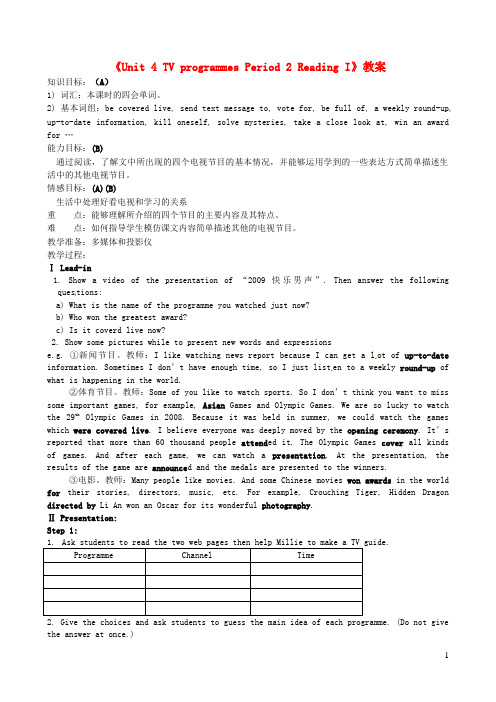
《Unit 4 TV programmes Period 2 Reading I》教案知识目标:(A)1) 词汇:本课时的四会单词。
2) 基本词组:be covered live, send text message to, vote for, be full of, a weekly round-up, up-to-date information, kill oneself, solve mysteries, take a close look at, win an award for …能力目标:(B)通过阅读,了解文中所出现的四个电视节目的基本情况,并能够运用学到的一些表达方式简单描述生活中的其他电视节目。
情感目标:(A)(B)生活中处理好看电视和学习的关系重点:能够理解所介绍的四个节目的主要内容及其特点。
难点:如何指导学生模仿课文内容简单描述其他的电视节目。
教学准备:多媒体和投影仪教学过程:Ⅰ Lead-in1. Show a video of the presentation of “2009 快乐男声”. Then answer the foll owingques tions:a) What is the name of the programme you watched just now?b) Who won the greatest award?c) Is it coverd live now?2. Show some pictures while to present new words and expressionse.g. ①新闻节目。
教师:I like watching news report because I can get a l ot of up-to-date information. Sometimes I don’t have enough time, so I just list en to a weekly round-up of what is happening in the world.②体育节目。
Unit 4 TV programmes
总课题9A Unit 4 TV programmes 总课时10 第6课时课题Grammar (II) 课型新授
教学目标知识目标 1. To use ‘while’ and ‘as’ to talk about when things happen;
2. To use comparative and superla tive adverbs.
能力目标 To foster the students’ abilities of comprehensive and application.
情感目标 To foster a good study habit. It’s good for physical and mental health.
教学重难点The usages of conjunctions “while and as”and the comparative degrees of adverbs.
How to apply these two parts of language knowledge.
教(学)活动自主个案
预习导学
1. 读一读:预习下列单词:while, as, farther, further, farthest, regular, viewe r, friendship, spaceman, regularly, expect, end, race.
2. 填一填:用while和as填写下列句子。
(1) ____________ I opened my eyes, I saw the sun shining brightly.
(2) ____________ I washe d the vegetables, Mum prepared the fish.
(3) ____________ I was shopping, I lost my wallet.
(4) ____________ I was doing my homework, my father was reading a maga zine.
3. 写一写:写出下列副词的适当形式。
原级比较级最高级
1. carefully ______________ ______________
2. ______________ ______________ most easily
3. ______________ faster ______________
4. early ______________ ______________
5. ______________ later ______________
6. ______________ ______________ highest
7. slowly ______________ ______________
8. seriously ______________ ______________
教学过程
Step 1 Revision Translate some phrases by using ‘between…and…’,‘from…to…’ and ‘before, after, until’
Step 2 Explain that ‘while’, ‘as’ mean ‘at the same time as’. We use them to talk about two or more actions that happen at the same time.(It is important to learn this topic)
Step 3 Read out the four examples o n page 67.
Step 4 Explain the context of the exercise at th e top of page 68. Step 5 Act out Students read the completed speech bubbles and the teacher divides the class into groups to role-play the conversation.
Step 6 Give students some examples using adjectives comparatives and superlatives
Step 7 Tell students to look at the picture in part D and identify which came first, second and third in the race. Go through the grammar table at
the top of page 69.
Step 8 Explain the context of the exercise at the bottom o f page 69 and ask students to complete it on their own.
Step 9 Homework Preview the next par t.
课内研讨
填一填(while, as)
1. _________ I opened my eyes, I saw my mother standing at the end of my bed.
2. _________ I washed the vegetable s, Mum prepared the chicken.
3. _________ I walked past the post office, a postman ran out of the door quickly.
4. _________ I was shopping, I lost my wallet.
选一选
( ) 1. Do not read so fast. You should read __________.
A. more slowlier
B. very m uch slowly
C. much more slowly
D. very slowly
( ) 2. To our surprise, the old man acted ___________ of all.
A. the best
B. most good
C. better
D. very good ( ) 3. If you work ________, you’ll be able to do it better.
A. hard
B. well
C. harder
D. better
( ) 4. Amy is the _________ students in our class. Do you agree?
A. careful
B. carefully
C. most carefully
D. most careful
( ) 5. --- Who jumped the ________ in the high jump? --- Sandy did.
A. longest
B. higher
C. hig hest
D. most high 训练巩固
词组翻译
1. 玩一个新的电脑游戏
2. 看一本旧杂志
3. 把电脑游戏收好
4. 收拾我的书包
5. 把它放进去
6. 准备看连续剧
7. 晚上剩余时间在电话中交谈8. 在赛跑中获得第三名
9. 在这四个演员当中10. 使他们感到无聊
拓展延伸
用before, after, until, while, as填空。
________ I was on the school bus this morning, it started to rain. Luckily, it stopped ___________ we got to school so I didn’t get w et. ____________ school, I played tennis with Amy. Then __________ that, I saw Daniel at the bus stop. ____________ we were waiting for the bus, it started to rain again. We waited inside ___________ the bus came.
Later this afternoon, I talked to Sandy on the phone _________ I got home from school. We chatted _________ 5.30 p.m. __________ we finished talking, I did my homework.
__________ I was doing my homework, Mum came home. She said I should finish my homework ________ dinner because she knew that I wanted to watch TV ______ dinner.。